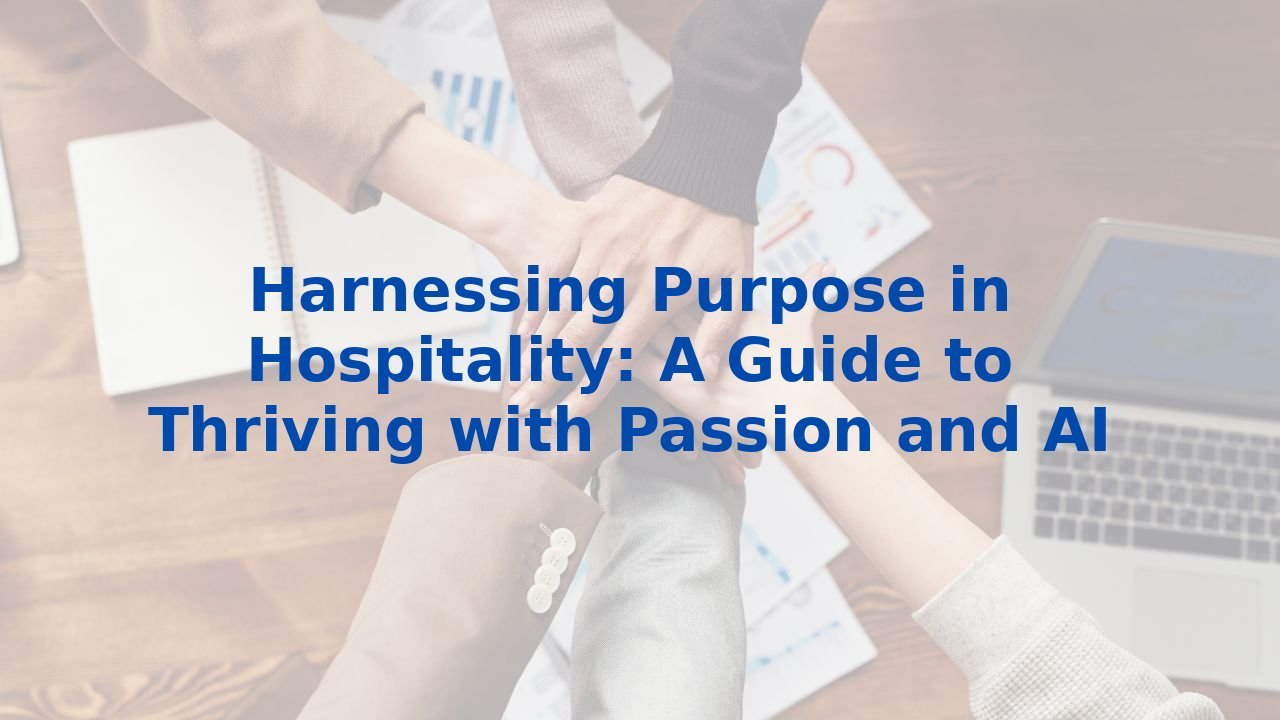Harnessing Purpose in Hospitality: A Guide to Thriving with Passion and AI
Harnessing Purpose in Hospitality: A Guide to Thriving with Passion and AI
In the ever-evolving landscape of the hospitality industry, the quest for efficiency and exceptional guest experiences can seem daunting. Yet, at the core of any thriving establishment lies a shared purpose—one that transcends mere transactions and delves into the realm of genuine human connection. By harnessing the transformative power of artificial intelligence (AI), hospitality businesses can not only elevate their operational efficiency but also rekindle the passion that fuels their mission.
Understanding the Role of AI in Hospitality
To grasp how AI can enhance hospitality operations, one must first recognize its pervasive influence. AI's capability to process vast datasets grants businesses unparalleled insights into customer preferences, market dynamics, and operational efficacy. This data-driven approach empowers hoteliers to make well-informed decisions, tailoring their services to meet guest expectations while innovating processes that elevate experiences.
Key AI Advancements in Hospitality
As we delve into the operational metamorphosis facilitated by AI, let’s explore several key advancements that are reshaping the hospitality sector:
“AI is not just a tool; it’s an ally in the pursuit of excellence.”
1. **AI-Powered Chatbots**
Imagine a world where your guests receive instant responses to their inquiries, whether it’s the middle of the night or during peak check-in hours. AI-powered chatbots are revolutionizing customer service by providing personalized interactions that help streamline bookings and address service requests, thus enhancing overall satisfaction.
2. **AI for Check-ins/Check-Outs**
Gone are the days of long lines and tedious paperwork. Automated check-in and check-out procedures equipped with AI capabilities expedite processes, minimizing wait times and enhancing guest convenience right from their arrival.
3. **Revenue Management/Dynamic Pricing**
AI’s ability to analyze demand forecasts, market conditions, and competitor pricing allows hotels to optimize their revenue management strategies. By adjusting pricing dynamically based on these factors, businesses can maximize occupancy and profitability.
4. **Personalized Marketing/Recommendation Engines**
AI doesn’t just respond; it anticipates. Personalized marketing campaigns supported by AI analyze guest behaviors and preferences, enabling hotels to tailor offers that resonate deeply with individual customers, fostering loyalty and repeated visits.
5. **Smart Room and IoT Integration**
Picture a hotel room where your guests can effortlessly adjust heating, lighting, and entertainment with just their voice. The integration of IoT devices and smart room technologies adds an extra layer of comfort and convenience, paving the way for memorable stays.
The Benefits of AI in Hospitality
The introduction of AI into hospitality is not just a trend; it is a catalyst for transformation. Let’s unpack the benefits:
1. **Enhanced Guest Experience**
AI empowers teams to provide round-the-clock assistance and personalized recommendations, leading to happier customers who feel valued. When guests know their needs are anticipated and met, loyalty flourishes.
2. **Streamlined Operations**
By automating repetitive tasks like bookings and check-ins, staff can devote more energy to creating extraordinary guest experiences rather than getting bogged down by administrative duties. This shift not only enhances operational efficiency but also redeems hours that can be spent nurturing guest relationships.
3. **Improved Efficiency**
Inventory management, energy consumption, and housekeeping can all be optimized through AI insights. This leads to the intelligent allocation of resources, translating to lower operational costs and a smaller environmental footprint.
4. **Data-Driven Decision Making**
With AI, decisions are backed by hard data rather than gut feelings. By leveraging advanced analytics, businesses can fine-tune marketing efforts and pricing strategies in real-time, fostering adaptability in an unpredictable market.
The Importance of Employee Training for AI
While the advantages of AI are clear, the real magic occurs when employees are adeptly trained to utilize these technologies. Implementing robust AI training programs can enable staff to simulate guest interactions, receive real-time feedback, and adapt their skills according to individual growth trajectories. The result? A workforce that’s engaged, informed, and equipped to elevate service standards.
Conclusion
In conclusion, the hospitality industry stands at a pivotal crossroads, where the fusion of purpose and AI presents unbounded possibilities. Embracing AI not only enhances operations but reignites the passion that fuels hospitality—delivering distinctive, personalized guest experiences. As businesses integrate AI and invest in comprehensive employee training, they empower their teams to unlock this potential fully. Together, you can navigate the complexities of the hospitality landscape with clarity, confidence, and a renewed sense of mission.



